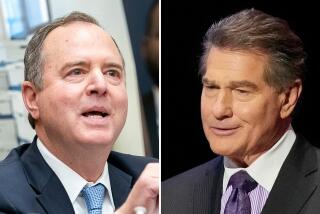Simon Rambles as He Assails Gephardt Vote
- Share via
HAMPTON BEACH, N.H. — Illinois Sen. Paul Simon, short of cash and in need of punchy clips on the evening news shows to help his Democratic presidential bid, Wednesday attacked rival Rep. Richard A. Gephardt for a vote nine years ago that would have speeded nuclear power plant licensing.
But the attack illustrated the difficulty Simon frequently encounters in trying to communicate in the sound bites so crucial to television:
“Dick Gephardt opposed the bill that would have prohibited the Nuclear Regulatory Commission from spending money to issue nuclear licenses in states where no Nuclear Regulation Commission-approved evacuation plan exists,” Simon said.
“This plant here in back of me,” he said, motioning toward the Seabrook nuclear energy facility, “would not be there, would be in operation if Dick Gephardt’s goal had been approved. He has said so since becoming a candidate, has reversed his position.”
Attempt at Distillation
What Simon was trying to distill for the TV news cameras Wednesday is that the Missouri congressman once wanted to let the NRC issue plant licenses even if a state had no NRC-approved evacuation plan--but now, running for President, Gephardt has decided that evacuation plans are a must.
However, Simon’s rambling and somewhat confusing remarks left reporters and half a dozen TV news crews struggling for the quick quote that synthesizes a position. Such two- or three-second clips have become the bread-and-butter of modern campaigning.
With little money to pay for political commercials, Simon must communicate through news events if he is to have a chance of finishing strongly in next Tuesday’s primary here.
Attacking Gephardt also is a key part of Simon’s strategy, since Simon believes he can emerge as the chief challenger to Massachusetts Gov. Michael S. Dukakis if enough voters learn that Gephardt’s record on such issues as nuclear safety has been inconsistent while Simon’s has been consistent.
Many Want Seabrook Closed
Nuclear power is a major issue here with New Hampshire voters, many of whom want to keep Seabrook closed because of evacuation plan problems.
And given Gephardt’s documented flip-flop, it was home run time for Simon on Wednesday as the cameras rolled.
But he not only blurred his message, he could not answer a related question shouted minutes later by a reporter.
Simon promised that as President he would have a commission that serves the public, not the nuclear power industry.
A reporter asked how he had voted in the Senate on new appointments to the commission.
Simon looked blank for a moment and said: “I have to say I don’t know precisely which nominees have come up.”
Candidate With Message
Earlier in the day, at a meeting with supporters in a Hampton restaurant, Simon had cast himself as a candidate with a powerful message but no big money to communicate it.
Simon aides said late Wednesday the campaign had borrowed $110,000 to air two television commercials beginning today in New Hampshire. Later, Simon flew to New York for fund raisers that he hoped will replenish his budget by as much as $150,000.
At the first fund raiser, in a room filled with wealthy liberals on Central Park South, Simon backer Rep. Stephen J. Solarz (D-N.Y) showed no hesitation in doing what Simon continues to have trouble with--launching an all-out attack on Gephardt, whose detractors accuse him of changing from a Washington insider to a populist just in time to surge ahead in last Monday’s Iowa caucuses.
“Michael Dukakis is favored to win the New Hampshire primary,” Solarz said. “ . . . The choice for second and the person who will be Dukakis’ major challenger . . . is a battle for the soul of the Democratic Party, a choice between demagoguery (Gephardt) and decency (Simon), between somebody who beats up on our allies (Gephardt) and someone who will negotiate toughly with our adversaries (Simon).”
Solarz later said his derogatory references were to Gephardt’s harsh warnings to the Japanese and Koreans over the U.S. trade deficit, which--captured in ads and speeches--were credited with giving him a victory in Iowa.
More to Read
Get the L.A. Times Politics newsletter
Deeply reported insights into legislation, politics and policy from Sacramento, Washington and beyond. In your inbox twice per week.
You may occasionally receive promotional content from the Los Angeles Times.









